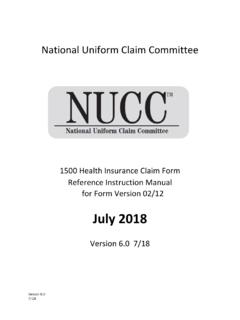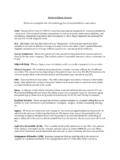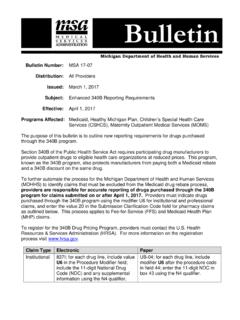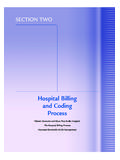Transcription of Diagnosis - ChiroMedicare
1 Medicare Diagnosis By Dr. Ron Short, DC, MCS-P Diagnosis o The Diagnosis is one of two codes that you place on the CMS 1500 form when you submit a claim . o The Diagnosis communicates the patient s condition to the computer that reads the claim . o The computer is programmed to read the Diagnosis and make certain decisions, including whether or not you get paid. o The more accurately that you diagnose the patient, the better you can manage the case and the better you will get paid and the less likely you are to be reviewed. o The primary Diagnosis must be subluxation, including the level of subluxation, either so stated or identified by a term descriptive of subluxation. Such terms may refer either to the condition of the spinal joint involved or to the direction of position assumed by the particular bone named.
2 1 o The spine is divided into 5 areas:2 Area of Spine Names of Vertebrae Number of Vertebrae Short form or Other Name Subluxation ICD-9 code Neck Occiput Cervical Atlas Axis 7 Occ, CO C1-C7 C1 C2 Back Dorsal or Thoracic Costovertebral Costotransverse 12 D1-D12 T1-T12 R1-R12 R1-R12 Low Back Lumbar 5 L1-L5 Pelvis Ilii r and l I, Si Sacral Sacrum, Coccyx S, SC Which Diagnosis Code to Use There are currently three groups of codes that are used by chiropractors to identify the subluxation: o The ICD-9 code o The ICD-9 code o And the HCPCS code S8990 1 Medicare Benefit Policy Manual Chapter 15, Section (A) 2 Local Carrier Determination L10881 HCPCS Code S8990 o There are three reasons for not using S8990 for Medicare billing.
3 O The Health Care Procedure Coding System (HCPCS) is developed and maintained by CMS and consist of a letter followed by a series of numbers. o The codes are categorized by the letter prefixes. o The S codes are Private Payer Codes. o Quoting from the HCPCS Manual: o HCPCS S codes are temporary national codes established by the private payers for private payer use. Prior to using S codes on insurance claims to private payers, you should consult with the payer to confirm that the S codes are acceptable. S codes are not valid for Medicare use. o S8990 is defined as physical or manipulative therapy performed for maintenance rather than restoration . o Maintenance care is not a covered service for Medicare beneficiaries. o As such, we are not required to bill Medicare for maintenance care and would not require a specific code for that a single Medicare Administrative Contractor lists code S8990 in a Local Coverage determination.
4 O If this code is not listed in the LCD then it is not acceptable to use when billing chiropractic services. Reason 1 is sufficient to explain why code S8990 is not to be used to bill maintenance CMT to Medicare. o However, if this code were allowed to be used for Medicare billing, then reasons 2 and 3 would come into play. ICD-9 code o Defined as other, multiple, and ill defined dislocations. o The 830-839 series of diagnoses are for dislocations and subluxations. o The subluxations referenced here are medical s Cylopedic Medical Dictionary defines subluxation as: A partial or incomplete dislocation. o This section provides individual codes for open dislocations and closed dislocations. o Open dislocations include: Compound, Infected, or With foreign body o Closed dislocations include: Complete, Dislocation NOS, Partial, Simple, or Uncomplicated o Clearly, the series of codes is not for use by chiropractors.
5 The series of codes. o These are defined as: Nonallopathic lesions not elsewhere classified. o They include: o Segmental Dysfunction o Somatic Dysfunction o This is the code that was designed for use by chiropractors. o This is the code that we should use for Diagnosis of the subluxation. o This code is listed in every state s Local Coverage Determination and thus is required by every carrier or MAC. Local Coverage Determination o The following is taken from the LCD for Illinois. There is similar language in almost every other LCD. o The neuromusculoskeletal condition necessitating the treatment must be listed as the secondary Diagnosis . Local Coverage Determinations are issued by Medicare Administrative Contractors to clarify policy regarding specific services.
6 O All but six states and Railroad Medicare have LCDs specific for chiropractic. o Connecticut, New York, North Carolina, South Carolina, Virginia, and West Virginia do not have LCDs specific for chiropractic. o At the top of each LCD is a section marked Document Information . o In that section will be a Revision Effective Date . o This date will tell you how current the information is that is in this document. o You should have a copy of your state s LCD for reference. o You can find the chiropractic LCD on the Mac s website. o Or you can find them on my website, under the resources tab. o Most LCDs contain the information provided in the Medicare Benefits Policy Manual, Chapter 15, section 240 that is specific to the documentation requirements for chiropractors.
7 Sacrum, Coccyx Sacral ILLII R & L Pelvis Lumbar Low Back Thoracic Back Cervical Occiput Neck ICD-9 Code Name of Vertebra Area of the Spine o Some will also contain utilization guidelines for chiropracticThe following is an example from the Illinois LCD: o Once the maximum therapeutic benefit has been achieved for a given condition, ongoing maintenance therapy is not considered to be medically necessary under the Medicare information, such as this on documentation requirements, will be present: o Documentation supporting the medical necessity of this item, such as ICD-9 codes, must be submitted with each claim . Claims submitted without ICD-9 codes will be denied as being not medically necessary. Documentation in the form of progress notes need not be submitted with each claim but be available upon that these are samples from the Illinois LCD.
8 O Yours may be different. o This is why you should have a printed copy on hand for your LCDs contain a list of diagnoses that are to be used for secondary diagnoses. o These are the only diagnoses to be used for this MAC. o The list below is from the Illinois LCD. o Some LCDs break them into sections like this and some do not. o The Local Carrier Determination (LCD) for a specific state or jurisdiction will list the ICD-9 codes that support medical necessity o Note: conditions must be coded to the ICD-9 code of highest specificity o The precise level of the subluxation must be specified by the chiropractor to substantiate a claim for manipulation of the spine. This designation is made in relation to the part of the spine in which the subluxation is identified 3 o There are two ways in which the level of the subluxation may be specified in patient's record.
9 The exact bones may be listed, for example: C 5, 6, etc. The area may suffice if it implies only certain bones such as: occipito-atlantal (Occiput and Cl (atlas)), lumbo-sacral (L5 and Sacrum) sacro-iliac (sacrum and ilium) 4 Diagnosis o Each area of the spine that is adjusted must have a primary and secondary Diagnosis to support medical necessity for the adjustment o The primary Diagnosis is derived from the table above o The secondary Diagnosis is derived from the lists below o The lists are divided into groups that support low, medium, and high levels of care o Only those diagnoses listed are accepted as support of medical necessity for the adjustment. 3 Local Carrier Determination L10881 4 Local Carrier Determination L10881 o Conditions that generally require short term treatment (less than 10 treatments)5 5 Local Carrier Determination L10881 o Conditions that generally require moderate term treatment (20 - 30 treatments)6 6 Local Carrier Determination L10881 o Conditions that generally require long term treatment (more than 30 treatments)7 Those states with articles do not have a list of secondary diagnoses to use.
10 I have prepared a Universal Medicare Diagnosis List that you can download for free at my website It is in the forms section. Hierarchy of Diagnosis Neurological Diagnosis o Sciatica Structural Descriptor Diagnosis o Degeneration of Lumbosacral Intervertebral Disc Functional Diagnosis o Difficulty Walking Soft Tissue, Extremity, Complicating Factors o Sprains and Strains of the Neck The condition must be coded to the highest level of specificity. If the highest level of specificity is soft tissue then that is what you code. Diagnosis The patient must have a significant health problem in the form of a neuromusculoskeletal condition necessitating treatment, and the manipulative services rendered must have a direct therapeutic relationship to the patient s 7 Local Carrier Determination L10881 condition and provide reasonable expectation of recovery or improvement of function.





